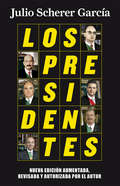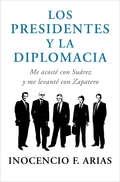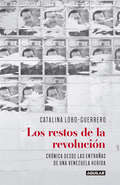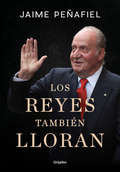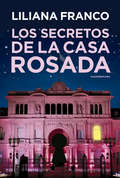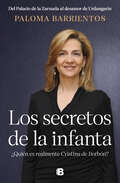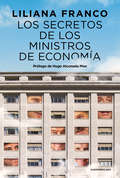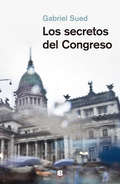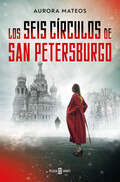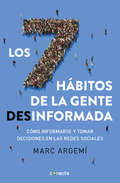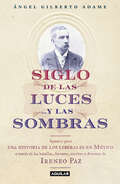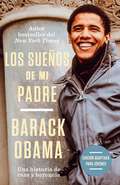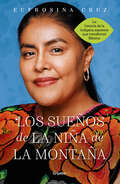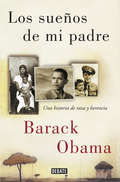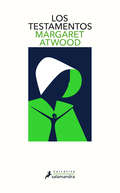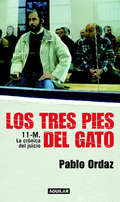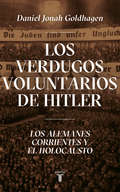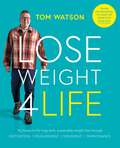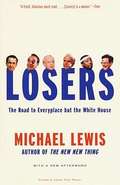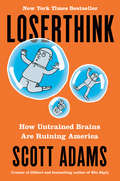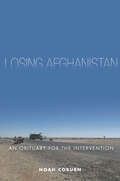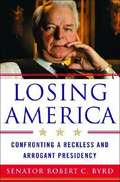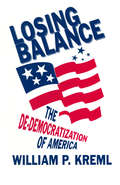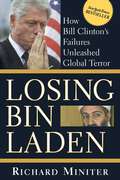- Table View
- List View
Los presidentes (nueva edición): Nueva edición aumentada, revisada y autorizada por el autor
by Julio Scherer GarcíaLos presidentes es resultado del oficio periodístico de Julio Scherer, de su talento literario y de la cavilación profunda acerca de cómo son por dentro los gobernantes mexicanos. En 1986 Julio Scherer publicó un libro destinado a convertirse en un clásico del periodismo político y literario: Los presidentes. A casi tres décadas de su publicación, esta nueva edición aumentada y actualizada es el más elocuente homenaje a su autor, fallecido a principios de 2015. Esta actualización procede principalmente de otros libros del autor, e incluye un anexo, "Las casas de los presidentes", basado en reportajes de la revista Proceso que Julio Scherer fundó y dirigió. Julio Scherer escribió este libro magistral convencido de que "eran muchos los crímenes contra la nación y eran pocos los que se atrevían a descorrer el velo que cubría a nuestros presidentes". Recurriendo a su "terca memoria", en esta páginas magistrales recuerda hechos, conversaciones, encuentros y desencuentros que tuvo con ellos -Díaz Ordaz, Echevarría, López Portillo y Miguel de la Madrid en la primera edición, a los cuales ahora se añaden Salinas, Zedillo, Fox y Calderón-, pero al mismo tiempo reflexiona sobre la condición humana de estos mandatarios. Así, Los presidentes es resultado del oficio periodístico, del talento literario y de la cavilación profunda acerca de cómo son por dentro los gobernantes mexicanos. Otro tema central de este libro es la libertad de expresión frente al poder presidencial, e igualmente se confrontan todos los tópicos asociados al ejecutivo en turno: el dedazo, la adulación incondicional, el control de la prensa y la corrupción, los cuales parecen repetirse ad infinitum en este sistema priista que sigue vigente. En esta nueva edición se reproduce un texto de Scherer, escrito en 2014, cuyo foco es el actual presidente, Enrique Peña Nieto, a quien ve comportándose como todos los demás, lo que resulta todavía más grave por todo el tiempo transcurrido, a lo largo del cual los gobernados han tenido que soportar los embates de este nefasto presidencialismo.
Los presidentes y la diplomacia
by Inocencio F. Arias¿Cómo vendió Adolfo Suárez al mundo la Transición democrática española? ¿Qué pasos tuvo que dar Calvo- Sotelo para la decisiva entrada del país en la OTAN mientras su partido se desangraba? ¿Por qué se celebró en Madrid durante el gobierno de Felipe González la conferencia de paz entre israelíes y palestinos más importante del siglo ? ¿Qué había detrás de la polémica foto de José María Aznar en las Azores junto a Blair y Bush? ¿Qué pecados cometió Zapatero con Estados Unidos? ¿Pintaban algo los diferentes ministros de Exteriores? ¿Es España más relevante en el mundo ahora que hace diez o veinte años?Si hay alguien que puede contarnos de primera mano estos y otros decisivos acontecimientos y responder a estas cuestiones, ese es Chencho Arias. A caballo entre la memoria y la recreación histórica, el famoso diplomático relata sin pelos en la lengua, y con su acostumbrada agudeza y sentido del humor, los aciertos y errores de cada presidente, sus fortalezas y debilidades, y las anécdotas internacionales más jugosas.Un libro imprescindible para conocer los secretos de la diplomacia española de los últimos treinta y cinco años, a cargo de un testigo de excepción.
Los presidentes y la diplomacia: Me acosté con Suárez y me levanté con Zapatero
by Inocencio F. AriasUn revelador viaje por la política internacional española de los últimos treinta años, de la mano de Inocencio Arias, el único diplomático que ha trabajado codo a codo con los cinco presidentes de la democracia de nuestro país. ¿Cómo vendió Adolfo Suárez al mundo la Transición democrática española? ¿Qué pasos tuvo que dar Calvo-Sotelo para la decisiva entrada del país en la OTAN mientras su partido se desangraba? ¿Por qué se celebró en Madrid durante el gobierno de Felipe González la conferencia de paz entre israelíes y palestinos más importante del siglo? ¿Qué había detrás de la polémica foto de José María Aznar en las Azores junto a Blair y Bush? ¿Qué pecados cometió Zapatero con Estados Unidos? ¿Pintaban algo los diferentes ministros de Exteriores? ¿Es España más relevante en el mundo ahora que hace diez o veinte años? Si hay alguien que puede contarnos de primera mano estos y otros decisivos acontecimientos y responder a estas cuestiones, ese es Chencho Arias. A caballo entre la memoria y la recreación histórica, el famoso diplomático relata sin pelos en la lengua, y con su acostumbrada agudeza y sentido del humor, los aciertos y errores de cada presidente, sus fortalezas y debilidades, y las anécdotas internacionales más jugosas. Un libro imprescindible para conocer los secretos de la diplomacia española de los últimos treinta y cinco años, a cargo de un testigo de excepción.
Los restos de la revolución: Crónica desde las entrañas de una Venezuela herida
by Catalina Lobo-Guerrero"Con este gran trabajo periodístico , Catalina Lobo-Guerrero no solo nos ayuda a entender mejor las figuras de Hugo Chávez y Nicolás Maduro, la psicología de la sociedad venezolana o el hundimiento de un país. También nos ayuda a comprender mejor la geopolítica global, el mundo contemporáneo, porque Venezuela se ha convertido en una gran derrota colectiva". -Jorge Carrió ¡Qué pasó en Venezuela! 2013, Tras la muerte de Hugo Chávez en el 2013, el que fuera el país más rico de Latinoamérica se agudizó una profunda herida, cuyas consecuencias más evidentes vemos casi a diario en las noticias: anaqueles vacíos, hospitales desabastecidos, represión militar y un éxodo sin precedentes. Pero pocos se han detenido a examinar la situación con cuidado, fuera del relato de la crisis. Catalina Lobo-Guerrero, por el contrario, va más allá. Periodista de larga trayectoria, se instaló como corresponsal en Caracas justo cuando se profundizó la grieta entre quienes aún creían en una revolución exigua, bajo las órdenes del nuevo comandante en jefe, y una oposición que luchaba por legitimarse. Y muchos, como ella, quedaron en el medio. En este libro, la autora busca comprender, antes que juzgar, un proceso complejo que la atraviesa como persona. En clave de crónica investigativa, y con una prosa sensible y cuidada, relata la dolorosa transición de Chávez a Maduro, hilada por las voces de quienes, sin importar sus ideologías, padecen las consecuencias de esta pugna política. Junto a ellos, nos invita a recorrer las entrañas del que fue su hogar durante casi cuatro años y a recordar la historia olvidada del vecino país; a desprendernos de los prejuicios y los lugares comunes, y a sacar nuestras propias conclusiones.
Los reyes también lloran
by Jaime Peñafiel¿Puede un rey equivocarse? ¿Puede un rey mostrarse humano? Juan Carlos I ha pasado en pocos años de ser una figura querida e indiscutible para la sociedad española a tener que huir a la capital de los Emirates Árabes, Abu Dabi, envuelto en todo tipo de turbias polémicas, no solo económicas sino también por las traiciones de alguna de sus "amigas entrañables". Cada día que pasa nuevas noticias ensombrecen su imagen y también la de la monarquía. Pero ¿está siendo justo el trato al rey emérito? ¿Se le está juzgando antes de otorgarle la debida presunción de inocencia? ¿Qué papel ha jugado Felipe VI en el exilio de su padre? Jaime Peñafiel, sin duda el mejor conocedor de la figura del monarca abdicado, analiza sus luces y sus sombras, sus malas compañías, su legado histórico y su talante… demasiado humano.
Los secretos de la Casa Rosada
by Liliana FrancoLas mejores anécdotas que desde el regreso de la democracia esconden las paredes de la Casa Rosada, la Meca con la que sueñan todos los políticos. Como todas las casas, la Rosada tiene vida cotidiana. Pero su día a día no se parece al de todos los hogares, porque las decisiones que allí se cocinan modifican la existencia de millones de personas. Poca gente es parte de esa vida: además de los funcionarios y los empleados, están los periodistas acreditados, que permanecen allí muchas horas para conseguir noticias de primera mano. Detrás de cada novedad que ellos divulgan hay historias, anécdotas y episodios que merecen ser conocidos. Un militar se creyó presidente y cuando llegó se enteró de que no lo era. Durante el juicio a las Juntas en 1985, hubo un Falcon viejo, con la chapa oxidada, estacionado varios días en la vereda. Antonio Banderas comió su primer choripán en la terraza, donde por esos años trabajaban telefonistas hot y acudían las "chicas del bolsito". Hay una palmera moribunda en el patio y un ascensor del que Mauricio Macri desconfía. Por la Rosada pasaron muchos funcionarios memorables, y cada presidente dejó algún recuerdo a quienes lo trataron durante su mandato. Liliana Franco -que trabajó en ella casi dos décadas- reunió estas y otras historias que, como un espejo deformado, reflejan a su modo los distintos períodos que atravesó nuestra democracia.
Los secretos de la infanta: Del Palacio de la Zarzuela al desamor de Urdangarin
by Paloma BarrientosUn libro revelador, minucioso y sorprendente que retrata sin tapujos a Cristina de Borbón, la protagonista del mayor escándalo en la historia de la monarquía española. Paloma Barrientos retrata sin tapujos a la protagonista del mayor escándalo en la historia de la monarquía española. ¿Quién es realmente Cristina de Borbón? ¿Cómo llegó esa niña que jugaba a la pelota en los jardines de la Zarzuela a sentarse en el banquillo como imputada frente al juez Castro? ¿Qué escondían las imágenes idílicas del papel cuché? ¿Realmente fue alguna vez la mujer sencilla y discreta que parecía? La infanta Cristina fue durante muchos años la más desconocida de los hijos de los Reyes. La mediana de la familia atrajo menos atención que sus hermanos, y creció pensando que podía pasar desapercibida. Se acostumbró a una vida independiente, cómoda y suntuosa, en la que todos sus deseos eran satisfechos de inmediato. La periodista Paloma Barrientos recrea con lujo de detalles la trayectoria vital de la infanta, desde su infancia hasta la imputación por el Caso Nóos.
Los secretos de los ministros de Economía
by Liliana FrancoLas mejores anécdotas que desde el regreso de la democracia esconden las paredes y pasillos del Palacio de Hacienda. ¿Cómo se gestó la salida de Luis Caputo del Banco Central? ¿A qué ministro apodan Chocoarroz? ¿Qué hizo Amado Boudou con su despacho? ¿Cómo recuerdan en el Ministerio a Roberto Lavagna, Alfonso Prat-Gay, Axel Kicillof y Guillermo Nielsen? ¿Cómo fueron las eternas peleas con el Fondo Monetario Internacional? ¿Quién fue el mejor jefe? ¿Y el peor? La preocupación por la economía ocupa los primeros puestos de las encuestas porque -para bien o para mal- afecta la vida cotidiana y determina nuestro futuro. Pensamos que, antes de ser tomadas, las medidas son analizadas, sopesadas y debatidas por expertos. Si la realidad a veces nos hace dudar de ello, Los secretos de los ministros de Economía revela que ese recelo puede ser acertado. Como hizo en Los secretos de la Casa Rosada, Liliana Franco nos guía esta vez por las oficinas, las salas y los pasillos del Palacio de Hacienda. Tras años de trabajo en ese ámbito, ella como pocos conoce el detrás de escena de muchas decisiones controversiales y los aspectos ocultos del ascenso o la caída de personajes clave. A su manera, las historias de este libro muestran un costado desconocido de las formas en que los gobernantes y sus funcionarios más cercanos ejercen el poder; y pueden explicar cómo nos va...
Los secretos del Congreso
by Gabriel SuedLos secretos del Congreso es el resultado de un esfuerzo por radiografiar, con honestidad y compromiso con el lector, un lugar inigualable del sistema político argentino. Los secretos del Congreso es un pase VIP para recorrer los pasillos del Palacio, aprender su idioma y descifrar sus reglas. Para entender lo que pasa en la institución más importante de la República y, a la vez, una de las más desprestigiadas. Con información precisa, este libro responde a preguntas siempre presentes en las oleadas de indignación popular: ¿Cuánto trabaja un legislador? ¿Cuánto le pagan? ¿Cuántos empleados tiene a su disposición? Con soporte académico, también intenta establecerse cuánto poder tiene el Congreso. Otros interrogantes guían el recorrido: ¿Qué artículos del reglamento se violan a diario? ¿Quiénes no hablaron nunca en el recinto ni presentaron proyectos de ley? ¿En qué consisten las negociaciones secretas para conseguir el quórum o para torcer el voto de un legislador? A partir de la reconstrucción de hechos reales, Gabriel Sued nos muestra la trastienda de debates como la reforma del sistema previsional y la legalización del aborto. Este libro incluye además un retrato íntimo de las dos figuras más destacadas del Congreso en los últimos treinta años: Miguel Ángel Pichetto y Elisa Carrió. Dos caras muy distintas de la misma moneda. Un senador que hizo del Palacio su territorio político. Una diputada que construyó su poder mirando hacia afuera. Un senador que siempre fue oficialista, incluso cuando fue opositor. Una dirigente que siempre fue opositora, también cuando integró el oficialismo.
Los seis círculos de San Petersburgo
by Aurora MateosUn intrigante thriller político ambientado en la Rusia contemporánea que indaga en las razones que explican la realidad actual del país.Un año después de la anexión de Crimea, el presidente de Rusia va a anunciar al mundo el revolucionario descubrimiento del oceonio, un mineral destinado a sustituir al petróleo. La situación se complica a raíz de una serie de misteriosas muertes repartidas en seis círculos en el mapa de San Petersburgo que apuntan al oligarca Serguéi Tomski, hombre del Kremlin y CEO de la compañía de energía Lozprom. Rodeada de oscuros intereses políticos y económicos, la vida de Mar Maese, una joven doctoranda española recién llegada al país, dará un vuelco al encontrar allí un amor que la expondrá al espionaje y a una peligrosa conspiración internacional.La primera novela de Aurora Mateos, una conocida dramaturga y experta en derecho internacional, actualiza para el siglo xxi la ficción de espías de la Guerra Fría, con una astuta trama que conjuga una bella historia de amor y una excitante intriga cuyo eje central es la ciudad de San Petersburgo. Mediante una narración soberbia y una documentación rigurosa, este potente thriller es también una recreación perfecta del clima político ruso, particularmente del conflicto con Ucrania, de los últimos años
Los siete hábitos de la gente desinformada: Cómo informarse y tomar decisiones en las redes sociales
by Marc Argemí BallbéVivimos el espejismo de creer que, como hemos consultado internet, estamos lo suficientemente informados para tomar buenas decisiones. Sin embargo, esta idea es errónea. Este libro permite identificar los hábitos que nos hacen más vulnerables a la desinformación en el entorno digital y ofrece las herramientas para decidir por nosotros mismos tanto en el terreno personal como profesional. Estar bien informado significa contar con suficientes datos para, de entre todas las decisiones posibles, poder elegir una. Sin embargo, la experiencia nos demuestra que muchas decisiones tomadas con seguridad están lejos de sustentarse en los datos, circunstancia que explica que podamos parecer al mismo tiempo unos perfectos ignorantes y muy decididos. Internet y las redes sociales han llevado esta problemática hasta el extremo. Nunca antes habíamos tenido acceso a tanta información, aunque esto no implica que seamos capaces de escoger mejor. Los algoritmos del entorno digital (donde conviven webs, Facebook, Instagram, Twitter o WhatsApp) no siempre están programados para ayudarnos a elegir de forma adecuada. Tenemos la engañosa percepción de que estamos bien informados y, por ello, decidimos correctamente. No obstante, la desinformación nos afecta en nuestra vida personal y profesional. ¿Soy víctima de este fenómeno? La respuesta, con toda probabilidad, sería afirmativa porque nos desinformamos con facilidad y de modos muy diversos. El objetivo de este libro es ayudar a identificar los hábitos que nos hacen más vulnerables: el cuñadismo, la incredulidad crédula, la indecisión crónica, la ansiedad, el confusionismo relacional, el activismo visceral y la precariedad informativa. Y, con sus herramientas prácticas para contrarrestar la desinformación, será de utilidad tanto para los expertos en redes sociales y profesionales de la gestión de cuentas en Twitter como para aquellas personas que solo visitan las páginas web de los periódicos de toda la vida.
Los siglos de las luces…y las sombras: Apuntes para una historia de los liberales en México a través de las batallas, fervoeres, escritos y derrotas de Ireneo Paz
by Ángel Gilberto AdameA pesar de sus paradójicas luminarias, la historia de México a veces es cruel con sus caudillos. Los arrincona, los hunde en empresas destinadas al fracaso, los arrumba en el olvido; prueba de ello es la mítica figura de Ireneo Paz, emblema de los liberales mexicanos, militar, poeta, crítico de su tiempo, novelista, editor vehemente y al final de sus días...solo un fantasma. Ángel Gilberto Adame ofrece en esta obra monumental un recuento súbito, espléndidamente documentado de los liberales en México a través de las acciones, disputas, publicaciones y conflictos de Ireneo Paz, quien pleno en sus convicciones / contradicciones expuso sus ideales y su honra al participar militarmente contra la invasión francesa desdeñada por Victor Hugo; cuestionó con viveza los mandatos de Juárez y Lerdo de Tejada; buscó la aprobación y cofradía de Porfirio Díaz, a quien creyó estabilizador de la patria; cedió al hechizo sombrío de Victoriano Huerta y, para él únicamente fue, al final de sus días, el banquete de la desolación.Siglo de las luces... y las sombras sitúa de forma concluyente a Ireneo Paz lo mismo en el campo de batalla que en el duelo donde perdió la vida el hermano de Justo Sierra; en la fundación de periódicos aguerridos que en la redacción del Plan de Tuxtepec que encumbró al porfirismo; en la cárcel y condenado a muerte que en el macabro homenaje al poeta Manuel Acuña.El trabajo de Adame es una indagación lúdica y límpida que, con su habitual deslumbramiento, comparte los vuelcos de la historia de México durante el siglo XIX y principios del XX al trazar el rumbo de un también periodista célebre de su tiempo que defendió sus posturas políticas inmerso en lo temerario, la confrontación y el yerro, al tiempo que encarnó la esenciadel idealista mexicano errabundo en el laberinto de la soledad y la violencia del México convulso de aquellos años y deseos.
Los sueños de mi padre. Edición para jóvenes / Dreams from My Father (Adapted for Young Adults)
by Barack ObamaAhora adaptadas para jóvenes, las memorias bestseller #1 del New York Times que Toni Morrison llamó “realmente extraordinarias” ofrecen una mirada íntima a los primeros años de Barack Obama. Se trata de un viaje fascinante que traza la odisea familiar, racial y de identidad del futuro cuadragésimo cuarto presidente. El retrato revelador de un joven hombre negro cuestionándose sobre el autodescubrimiento y la pertenencia… mucho antes de convertirse en una de las voces más importantes de Estados Unidos. Esta edición única incluye una nueva introducción del autor, un inserto de imágenes a color y un árbol genealógico. Hijo de una madre blanca de Estados Unidos y un padre negro de Kenya, Obama nació en Hawai, donde vivió hasta los seis años, cuando se mudó con su madre y su padrastro a Indonesia. A los doce años regresó a Hawai para vivir con sus abuelos. Obama lleva a sus lectores consigo mientras enfrenta los retos en high school y universidad, en su vida en Nueva York, al convertirse en organizador comunitario en Chicago y al viajar a Kenya. A través de tales experiencias forma un compromiso duradero con el liderazgo y la justicia. Contado a través de las relaciones con su familia —la madre y los abuelos que lo criaron, el padre que consideraba más mito que hombre y el clan familiar que conoció en Kenya por primera vez—, Obama hace frente a la complicada verdad de la vida y el legado de su padre, y termina por abrazar su origen dividido. En su viaje hacia la edad adulta desde sus humildes inicios, se forja su propio camino mediante ensayo y error, mientras permanece siempre conectado con sus raíces. Barack Obama está decidido a llevar una vida de servicio, con propósito y autenticidad. Su poderosa autobiografía inspirará a los lectores a examinar de dónde vienen y hasta dónde son capaces de llegar.
Los sueños de la niña de la montaña: Memoria de una utopia cumplida
by Eufrosina Cruz MendozaEste libro cuenta una historia de terquedad y rebeldía. La de una niña que a los 12 años decidió escribir su destino y, de paso, ayudar a miles y miles de mexicanas a cambiar su suerte Soy Eufrosina Cruz y nací en la montaña zapoteca. A los 27 años gané la presidencia de mi pueblo, pero no me dejaron gobernar porque era mujer. En ese momento supe que, para cambiar mi vida y la de las mujeres indígenas, debía transformar la ley más importante de mi país. Desde entonces, mi lucha ha sido para que los pueblos indígenas y afro no sean considerados menores de edad y para que las mujeres no sean personas de segunda. En este viaje he logrado modificar la Constitución de mi estado, cambiar la Constitución de México y que la onu adoptara mi iniciativa contra el sexismo y la discriminación. Pero lo que más me enorgullece es que he podido decirles a las niñas que tienen derecho a ser quienes quieran, a que su origen no defina su destino y a que pueden cumplir sus sueños, tal como lo hizo esta niña de las montañas.
Los sueños de mi padre: Una historia de raza y herencia
by Barack ObamaEn estas memorias líricas y absorbentes, publicadas originalmente en 1995, el hijo de un africano negro y una estadounidense blanca busca su camino como afroamericano. Las memorias que Obama relata en Los sueños de mi padre comienzan en Nueva York, donde se entera de que su padre ha fallecido en un accidente automovilístico. La inesperada noticia provoca en él un viaje físico y emocional que lo lleva de Kansas a Hawái y más tarde a Kenia, en una emotiva odisea que le permitirá conocer realmente a su familia, la amarga verdad de la vida de su padre y conciliar al fin las distintas partes de su fragmentada herencia. Reseñas:«Provocador... Describe convincentemente el hecho de pertenecer a dos mundos diferentes y, por tanto, de no pertenecer a ninguno.»New York Times Book Review «De una manera fluida, tranquila y perceptiva, Obama nos guía directamente al sitio donde se cruzan los interrogantes más serios sobre identidad, clase y raza.»Washington Post Book World
Los testamentos
by Margaret AtwoodEn esta brillante secuela de El cuento de la criada, la aclamada autora Margaret Atwood responde a las preguntas que han cautivado a los lectores durante décadas. Novela ganadora del Man Booker Prize 2019 «Subo y penetro en la oscuridad del interior; o en la luz.» Cuando las puertas de la furgoneta se cerraron de golpe tras Offred al final de El cuento de la criada, los lectores no tenían forma de saber cuál iba a ser su futuro: la libertad, la prisión o la muerte. Con la publicación de Los testamentos, la espera ha terminado. Margaret Atwood recupera la historia quince años después de que Offred se adentrara en lo desconocido, con los testimonios asombrosos de tres narradoras del mundo de Gilead. «Queridos lectores y lectoras: vuestras preguntas sobre Gilead y su funcionamiento interno han sido la fuente de inspiración de este libro. ¡Bueno, casi todo! La otra es el mundo en el que vivimos.»Margaret Atwood La crítica ha dicho...«El acontecimiento literario del año.»The Guardian
Los tres pies del gato: 11-M. La crónica del juicio
by Pablo OrdazHay trabajos periodísticos que con el tiempo alcanzan la consideración de clásicos por la fuerza de su denuncia, por la energía de sus descripciones, por el ritmo literario o por poner en primer plano los detalles importantes. Esta crónica está escrita junto a la habitación de cristal blindado. Allí dentro hay fanáticos que llevan en su frente la señal de golpes diarios contra la alfombrilla del rezo, pero también los hay que presumen de juergas, amantes y drogas. Los hay de conversión reciente y quienes durante años viajaron por todos los escenarios que en Europa se han ido vistiendo de sangre. Algunos de ellos fueron dejando su rastro por trenes, pisos y huesos de dátil; otros, más peligrosos aún, aportaron a la causa del odio su alta cuna, su coeficiente intelectual y sus muchos idiomas. El relato intenta penetrar en el porqué de las intenciones últimas de los que llevaron el horror a cimas inimaginables, pero también noshabla, desviando la mirada del escenario principal, de la vergüenza de padres, hermanos o esposas que, compartiendo sangre o cama con los presuntos culpables, no se dieron cuenta hasta demasiado tarde del círculo del mal en el que estaban viviendo. Y se detiene, a veces con la ironía como recurso estilístico, en quienes, sin pudor ni respeto alguno por los hechos, por las víctimas o la salud de la convivencia política, han tergiversado, mentido, difamado. Hay trabajos periodísticos que con el tiempo alcanzan la consideración de clásicos por la fuerza de su denuncia, por la energía de sus descripciones, por el ritmo literario o por poner en primer plano los detalles importantes que a otros pasan desapercibidos. El texto de Pablo Ordaz pertenece a esta categoría.
Los verdugos voluntarios de Hitler: Los alemanes corrientes y el Holocausto
by Daniel Jonah GoldhagenUna obra escrita con rigor y minucia; una verdadera revisión, a la contra, del más terrible suceso de nuestro siglo: el intento de exterminio de toda una raza, la judía, por parte de los nazis. ¿O podría decirse, y esta es la gran cuestión del libro, de los nazis y el pueblo alemán? Gran éxito internacional, sometido a durísimas polémicas, este libro aporta un nuevo modo de entender el Holocausto. Basándose en pruebas nuevas e inquietantes, Goldhagen prueba que el antisemitismo estaba profundamente enraizado en la sociedad alemana, donde era común la noción de que había que eliminar a los judíos. Así se explicaría que a Hitler no le fuera difícil enrolar un gran número de alemanes en «la solución final».
Lose Weight 4 Life: My blueprint for long-term, sustainable weight loss through Motivation, Measurement, Movement, Maintenance
by Tom Watson'An honest and fascinating account of the journey that Tom made from discovering he was a type 2 diabetic to doing something about it. This book will change lives.' Michael Mosley, on The Sunday Time's bestseller DownsizingFrom the bestselling author of Downsizing, a guide to losing weight - and keeping it off - as well as improving health, from someone who has successfully done both, Lose Weight 4 Life outlines the programme Tom Watson followed for his own remarkable 8-stone (50kg) weight loss. Divided into 4 sections - Motivation, Movement, Measurement and Maintenance - it includes relatable examples of Tom's own, often bumpy, journey to better health, which saw him transform from someone who mindlessly hoovered up entire packets of biscuits at one go and had to rummage in the XXXL bin for exercise gear into someone who rowed the length of the UK. Packed with practical advice backed up by the latest research, Lose Weight 4 Life demonstrates that it is never too late to turn things around, even if you are someone who has failed umpteen times before.
Losers: The Road to Everyplace but the White House
by Michael LewisA wickedly funny and astute chronicle of the 1996 presidential campaign--and how we go about choosing our leaders at the turn of the century. In it Michael Lewis brings to the political scene the same brilliance that distinguished his celebrated best-seller about the financial world, Liar's Poker.
Loserthink: How Untrained Brains Are Ruining America
by Scott AdamsFrom the creator of Dilbert and author of Win Bigly, a guide to spotting and avoiding loserthink: sneaky mental habits trapping victims in their own bubbles of reality. If you've been on social media lately, or turned on your TV, you may have noticed a lot of dumb ideas floating around."We know when history will repeat and when it won't.""We can tell the difference between evidence and coincidences.""The simplest explanation is usually true."Wrong, wrong, and dangerous!If we're not careful, loserthink would have us believe that every Trump supporter is a bigoted racist, addicts should be responsible for fixing the opioid epidemic, and that your relationship fell apart simply because you chewed with your mouth open.Even the smartest people can slip into loserthink's seductive grasp. This book will teach you how to spot and avoid it--and will give you scripts to respond when hollow arguments are being brandished against you, whether by well-intentioned friends, strangers on the internet, or political pundits. You'll also learn how to spot the underlying causes of loserthink, like the inability to get ego out of your decisions, thinking with words instead of reasons, failing to imagine alternative explanations, and making too much of coincidences.Your bubble of reality doesn't have to be a prison. This book will show you how to break free--and, what's more, to be among the most perceptive and respected thinkers in every conversation.
Losing Afghanistan
by Noah CoburnThe U.S.-led intervention in Afghanistan mobilized troops, funds, and people on an international level not seen since World War II. Hundreds of thousands of individuals and tens of billions of dollars flowed into the country. But what was gained for Afghanistan--or for the international community that footed the bill? Why did development money not lead to more development? Why did a military presence make things more dangerous? Through the stories of four individuals--an ambassador, a Navy SEAL, a young Afghan businessman, and a wind energy engineer--Noah Coburn weaves a vivid account of the challenges and contradictions of life during the intervention. Looking particularly at the communities around Bagram Airbase, this ethnography considers how Afghans viewed and attempted to use the intervention and how those at the base tried to understand the communities around them. These compelling stories step outside the tired paradigms of 'unruly' Afghan tribes, an effective Taliban resistance, and a corrupt Karzai government to show how the intervention became an entity unto itself, one doomed to collapse under the weight of its own bureaucracy and contradictory intentions.
Losing America: Confronting a Reckless and Arrogant Presidency
by Robert C. ByrdThe long-time Democratic Senator from West Virginia gives his perspective on Bush's policies, drawing on his experience as a senator since the Kennedy era, as well as his knowledge of America's history and Constitution.
Losing Balance: De-Democratization of America
by William P. KremlThis text offers students a fresh, comprehensive, multidisciplinary entry point to the broader Middle East. Readers will come away from this book with an
Losing Bin Laden: How Bill Clinton's Failures Unleashed Global Terror (Playaway Adult Nonfiction Ser.)
by Richard MiniterLosing Bin Laden: How Bill Clinton's Failures Unleashed Global Terror by Richard Miniter
